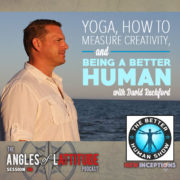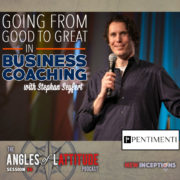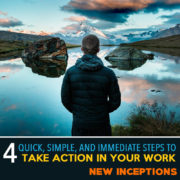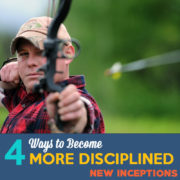The Importance of Why: Learning How to Get Going when the Going Gets Tough
People wonder where I get inspired for my writing. Sometimes I get inspiration from the people I’m working with. Other times, it’s just to fill a knowledge gap in my content.
Yet, other times, it’s when I’m constantly berated by a subject and I need to make an account of all that is coming my way.
I mean, when the universe tells you to do something, you better be listening and be prepared to act, right?
Passion is Half the Battle:
In the last two blog posts, I wrote about building a website. While this might not necessarily be the most interesting to me, it is a question that I can answer and have a knack to help people get started on. It’s kinda like me and math. Can I teach it? Sure. Do I have a passion for it? Well, I have a passion that people are educated. So… in a way I guess? But not directly.
Same thing for building websites. Is it something that I can help people with? Sure. I had to figure it out on my own and if I can help someone else figure it out, then I’m happy.
Also, it’s a question that I’ve been meaning to respond to in a blog post form for awhile.
Today’s post has a little bit of both: “Something I want to make sure people get because it’s important” and something that I’m asked about quite a bit.
How did I find my Why?
The Secret is in the Why:
Pursuing your Passion with a definite Why, I believe, is one of the critical parts of being happy, building a successful life, and building a thriving business.
I share this belief with a well known author, Simon Sinek.
If you’re unfamiliar with Simon, there’s been a big TEDx speech of his out there on the web for several years now. Time and time again I recommend it to people if they’re having trouble finding their Why.
Good stuff, huh?
Bonus: He also just recently did an interview with Marie Forleo that came out last week about his newest book.
Don’t Forget about Being Happy:
As Simon was saying in that last video, many times we get so focused on the small details of a job that might actually be part of our Why, that we forget about why we started it in the first place. When this happens, we might actually become unhappy.
I was listening to a really interesting conversation between Jordan Harbinger and Raj Raghunathan that was paralleling this thought as well.
Among many of the great points that Raj talks about in the discussion, he points out that we all need three main things to be happy: Mastery, Belonging, and Autonomy.
- Mastery: We need to feel that we’re good at something.
- Belonging: We need to feel a sense of intimacy or connection with at least one other person.
- Autonomy: We need to feel a sense of freedom in what we’re doing. (Not to be micromanaged.)
Just a note here: Mastery is another way of describing passion. Those that don’t have a passion in a particular subject rarely care to develop a mastery in or of it.
A Recent Example:
Say you’re interested in starting a podcast. You want to have really interesting conversations with people and get those out into the world and inspire others to take certain actions.
That focus – having really interesting conversations with others – might meet the three criteria of being happy.
However, when you start figuring out the details of where the host for the recordings might be and what the your site looks like that you’re posting the talks to, those might be things you don’t really want to deal with.
As you get lost in the details of getting technical things prepped to do the show, you might actually start asking yourself why you started thinking that you wanted to do podcasts in the first place.
Right?
Well, for starters – the two are not mutually related. Technical parts of doing a podcast aren’t the same as actually being the host. In fact, the only “technical” thing a host should do is hit the record button. In the ideal world, you’d have people to help you with all the other stuff.
You don’t necessarily have to pay those folks, either. There’s plenty of trading that goes on in the business world behind the scenes – both online and offline. Maybe you have a talent that they need as well? They help you, you help them.
And the other thing is that this is where the Why gets you through. Without a strong Why, you might just tap out early on in your endeavor of being a podcaster. There’s a saying that goes, “If you want something bad enough, the facts don’t matter!”.
More Resources to Help You Find Your Why, Your Passion, and Find What Makes You Happy:
If you’re wanting to make sure that you’re on the right path, that you’re on it for a good reason, and that you want to make sure you can make it all the way through to completion, then there’s a few resources that I think you should check.
- Pat Flynn’s Book: Will It Fly
- Cal Newport’s: So Good They Can’t Ignore You: Why Skills Trump Passion in the Quest for Work You Love
- Mark Nathan and David Anderson’s Book: The Delusion of Passion
- Raj Raghunathan’s HappySmarts Project
Action Steps:
As I was writing this post, I took a short break and ran across an interesting piece that I wanted to share with you guys:
When you think about this family – is it clear to you that Garrett knew his why when he was building his business? Do you think it was what he started with or did it grow over time? Or perhaps he realized it when he sold his business?
Regardless, the Why was deciding factor of the life that they have now.
The best thing you can do with yourself before you ever start your business is to figure out what really motivates you to start working and to keep going when it’s hard for you to do anything. Us solopreneurs, we have very wild emotional roller coasters. One day we feel like we’re on the top of the world, the next day we could feel like “meh”.
If you don’t get the books that I’ve mentioned in this post (which I think might be a mistake), I’d definitely check out interviews that they’ve done, and talks they’ve given across the web.
Also, another something that I think would help you is making a bucket list for yourself as well as a list of things that would be fun to do with your family (if you have one). Make each one at least 10 to 20 items. Let it be as wild as you want.
Now from there, start categorizing these into things that don’t cost anything or very little, all the way up to those that cost a fortune (like a prolonged trip, a boat, or a better house!)
Those that don’t cost anything or cost very little, you should plan to do them as rewards soon.
The more the something costs, the higher up on your success ladder you should place it. Think of it as a reward for getting to that level of success.
Now find some pictures of these rewards and place them on a bulletin board, tape them on the back of a door, or, put them up on a refrigerator. These are forms of what many people call Vision Boards. If you need help of what I’m talking about – here’s an example:
I’d love to see what you all come up with!









